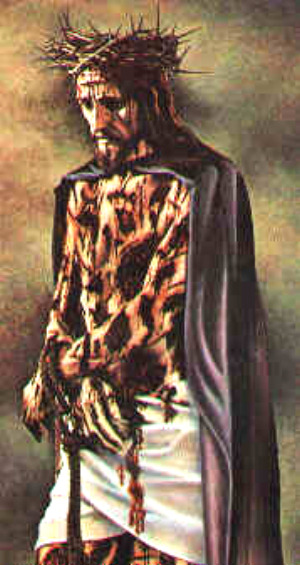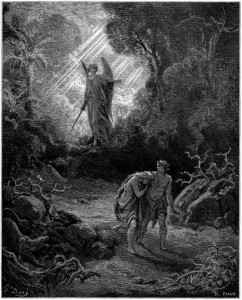Perhaps the greatest argument that horror lit can contain redemptive elements is the Bible and its message about the sacrifice of Jesus Christ.
The apostle Paul summarized what transpired on the Cross this way:
For God made Christ, who never sinned, to be the offering for our sin, so that we could be made right with God through Christ. — II Corinthians 5:21 NLT
The crucifix symbol has been glamorized in our culture. Nevertheless, the Cross was a horror in its time. Many have illustrated the gruesome medical details concerning the practice of crucifixion (see: The Horror of Roman Crucifixion). While the Bible does not give us play by play description of the Christ’s execution, in its time, it didn’t need to. The first century Jew or Gentile needed no reminder of the grisly details.
Isaiah prophesied roughly 700 years before Christ about the Suffering Servant:
…his appearance was so disfigured beyond that of any human being
and his form marred beyond human likeness (Is. 52:14 NIV).
Some may see this description as gratuitous. Nevertheless, it corroborates much of what we know about Roman crucifixion and the beatings suffered by those at the centurion’s hands. Indeed, it was reported that pre-crucifixion scourging was so brutal that many prisoners never made it to the cross.
In a more poetic stroke, the prophet writes
Surely he took up our pain
and bore our suffering,
yet we considered him punished by God,
stricken by him, and afflicted.
But he was pierced for our transgressions,
he was crushed for our iniquities;
the punishment that brought us peace was on him,
and by his wounds we are healed.
Isiah 53:4-5 NIV
This section of Scripture, while laden with redemptive pathos, is loaded with horrific imagery: pain, suffering, punishment, affliction. Those who object to horror lit strictly on the grounds that it is shocking, violent, and scandalous, should consider that The Most Redemptive Story Ever Told contains such imagery.
But perhaps the most horrific element of the crucifixion of Christ is not the physical torment inflicted, but the spiritual reality behind it. “Christ, who  never sinned [became] the offering for our sin” (II Cor. 5:21). We take the concept of Man as Sinner for granted. However, Scripture portrays the Fall of Man as the greatest of all horrors. That beings created in the Image of God would turn from Him is more abominable than the entire history of slasher flicks combined. In fact, every atrocity, whether real or imagined, can only be understood in the light of our Fall (in the same way that horror must be defined by the good and beautiful). Adam and Eve being driven from Paradise is perhaps the genesis of all human horrors.
never sinned [became] the offering for our sin” (II Cor. 5:21). We take the concept of Man as Sinner for granted. However, Scripture portrays the Fall of Man as the greatest of all horrors. That beings created in the Image of God would turn from Him is more abominable than the entire history of slasher flicks combined. In fact, every atrocity, whether real or imagined, can only be understood in the light of our Fall (in the same way that horror must be defined by the good and beautiful). Adam and Eve being driven from Paradise is perhaps the genesis of all human horrors.
In this way, the atonement of Jesus Christ is horrific — not just because He “became sin” and submitted Himself to public torture, but that He was sinless when He did so. That which is Perfect voluntarily became what is Flawed. The Beloved became the Outcast. The Spotless Lamb became the Scapegoat.
It is the melding of horror and redemption, The Greatest Story Ever Told. And it is, in part, a horror story.














Great points. Too often we talk about the crucifixion as an event, when it was actually a means of torture. In our sanitized way of thinking Christ was crucified. In the real world, however, he was tortured to death for me, for you and for everyone else. And the end result of that torture was our redemption.
Again, great thoughts. Bravo.
Thomas Smith
Author of Something Stirs
I really loved some of these points and plan to use them when people ask why their youth minister’s wife loves horror so much and *gasp* even writes it.
Off the top of my head, the top horror novels of all time are exactly that because they grasp so faithfully (if unwittingly) and so precrariously (if sometimes unsuccessfully) for a benevolent God who rescues from sin.
Salem’s Lot – Stephen King – “Flawed people in the balance” versus the damned.
Dracula -Bram Stoker – Letters regarding the Anti-Christ.
The Shining – Stephen King – An alcoholic plagued by demons sacrifices himself to save the innocent.
Anno Dracula – Kim Newman – Even the victory of the Anti-Christ is hollow, temporal and finite.
Ghost Story – Peter Straub – Old men, filled with regret, face a spirit world that finds their quality in want. Whither their quality to face it?
Our Lady of Darkness – Fritz Leiber – The occult, at the height of its power, is a natural and intricate economic formula and illustration of _why_ the wages of sin are death.
It -Stephen King – The presence and activity of evil gods betray their dependence on sin, and their powerlessness against God’s good.
Summer Of Night – Dan Simmons – Fellowship is critical in the struggle against evil.
The Haunting Of Hill House – Shirley Jackson – The struggle against sin, no matter how valiant or strong the human agent, demands a redeemer.
I can’t name a decent horror novel that doesn’t, at least in the most oblique way, acknowledge God and His Host. The most effective (those above) intentionally or unintentionally plunge right in.
I should mention that there are _plenty_ of horror novels that don’t aspire to seek the face of God, that recycle tropes without reflection, that tell a crude adventure designed merely to shock/amuse…fleeting things that say nothing of the nature of God’s creation or character.
There are also forgettable romances, banal Amish stories, and “literary” fiction of no consequence. In short, there is plenty of space-taking, “Bottommost for None’s Lowest” reading material available. All of it, along with bad horror, is, ultimately, useless chaff.
However, if you want to get evangelical about it: go horror.
That’s where the people who are seeking the wisdom and truth of a Redeemer are going…and finding His type, if, less often, His reality.
Those are some great selections. Over half of them are my favorites…
I agree with your thoughts Mike. I’ve enjoyed how they revealed how God showed us horrific images in the Bible in order to turn us to His love, comfort, glory, and holiness. I expounded on this in a blog post by saying that Christians can also write horror to show that God is to be feared above all. This has opened up all kinds of possibilities for writing horror stories where characters can use fear to turn them to God and let the fear of the Lord sustain them even if they will get eaten by zombies.
Thank you all for the inspiration to write Redemptive Horror. I don’t know if that genre title was coined before, but I like it. I started reading Isaiah based in part on this post, and also found justification in chapter 21: 3-4. God’s judgment is horrific to watch, but I’m glad He does to show us the reality of His power and the need for judgment for sin. We can illustrate that when we write horror.
Thanks xdpaul for showing me many other quality themes explored in horror.
p.s. Great topic to inspire me to read your book Mike. I just got it in the mail today!
Thanks, Tim! Yes, we just finished studying the Book of Isaiah at church. The prophet’s colorful descriptions don’t just end at the Cross. He uses some florid descriptions for social sin and injustice as well.